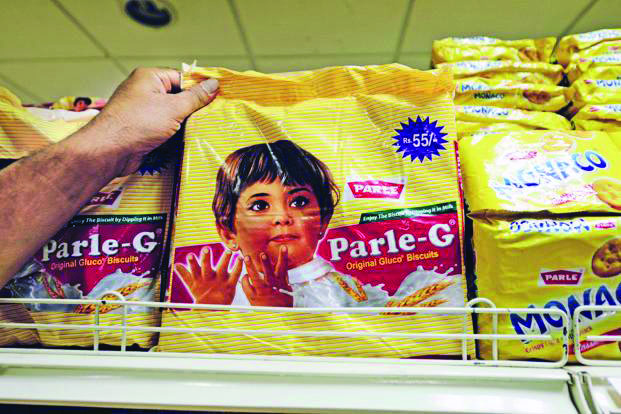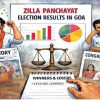Goa is abuzz with excitement as vintage bike and car owners, users, collectors and fans are decking […]

CONSUMPTION FALLS DRIVEN BY HIGHER GST!
MIND & BODY, HEART & SOUL, Sept 21- Sept 27 2019 September 20, 2019UNFAIR: The government has clubbed biscuits which are premium in nature with standard biscuits that cost less than 100 per kg and subjected them to 18% GST. Mayank Shah, category head of Parle Products, says, “there is no processed food available in the market that is100 and below per kg in India. If you tax the common man’s food at 18% GST, it is not right”
BY RAJAN NARAYAN
And a few stray thoughts for yet another Saturday. For a Saturday following the week when only 2.5% of the hundred-odd jobs aspirants for government jobs managed to pass the computerized test conducted by the Goa Public Service Commission (GPSC). For a Saturday following the week when Sanjit Rodrigues was back as the commissioner of the Corporation of the City of Panjim. For a Saturday following the week when rumours persisted that Vijai Sardesai and Sudin Dhavalikar, the two Deputy CMs who had been dropped from the Cabinet, will merge with the BJP.
POOR PERCENTAGE?
And a few stray thoughts on the continued low pass percentages which marks the exams conducted by the Goa Government and the Goa Public Service Commission (GPSC) for recruitment to Government jobs.
In the latest round of recruitment, which included lecturer posts in various colleges and junior government officers, only 2.5% of the over thousand candidates who applied secured the minimum passing marks. Interestingly, more candidates from the economically weaker section passed the test than from other sections of society. After the computer online test, those aspiring to be junior officers in the government have to complete a written 16-page exam.
This is even more difficult for most Goan employees as it requires wide knowledge of a variety of subjects like rural development, finance industry, labour relations, etc. This is not the first time that the pass percentage in competitive exams held by the Goa government has been very poor. When the GPSC was first set up under the chairmanship of the late Dr JC Almeida, he ensured that merit was the only criteria for passing the exam.
To set an example, for the post of personal assistant to the chairman of the GPSC, Almeida not only supervised the written exam personally, but shared the answer papers with the candidates so that there should be no doubt that there was any bias.
The then CM Pratapsingh Rane and the rest of the Cabinet wanted the GPSC to restrict itself only to grade one and grade two officers. Selling government jobs was big business then and continues to be so now. Consequently, every minister wanted to control jobs relating to his department.
A typical example is the GMC. The majority of class four staff or attendants as they are called in the GMC are from the Sattari constituency. Health Minister Vishwajit Rane even created a category called assistant attendant to create additional jobs for people from his constituency. Since all the candidates given jobs by Vishwajit had allegedly paid in advance, they considered themselves Baba’s men and would refuse to do any work.
I recall visiting the then Dean’s office as I had an appointment in the OPD with one of the doctors. The Dean summoned the available attendant and asked him to take me to the concerned department. The moment we came out of the office, the Baba’s attendant passed on the buck to some other attendant as ironically he claimed that he was not familiar with the layout of the hospital.
Recently Vishwajit Rane announced that he is planning to recruit more than 1,000 employees in the GMC because of the severe shortage. The real reason of course being to create jobs for members of his constituency.
Unfortunately for Vishwajit, Chief Minister Pramod Sawant turned down the suggestion and made it clear that there would be no one-time recruitment of a 1,000-odd employees and that the recruitment would be spread over a period of time. To prevent charges of corruption Chief Minister Sawant also made it clear that the recruitment would be done by a Central State Commission and individual departments would not be allowed to fill up the vacancies.
Vishwajit’s new mantra for making money seems to be outsourcing. Even while acknowledging that there was a serious shortage of jobs, particularly for nurses and technicians, Vishwajit has been outsourcing the 600-odd catering jobs to a French company Sodexo for which interviews are not held in Goa.
No FACILITIES, No STAFF
Although the South Goa District Hospital is not complete and the hospital still struggle to function in the premises of the old Hospicio, it has been decided to expand the capacity to 750 beds.
Even the North Goa District Hospital is not fully complete. Health Minister Rane, who swears by privatisation, is planning to set up a private 100-bed medical college linked to the South Goa District Hospital.
The problem is not a shortage of nursing homes and hospitals in the State. In fact every other day, a Goan who completes his MBA starts a super specialty centre. The most popular are the old nursing homes, including the discredited Pai Hospital at Vasco which has become a fertility centre. Together with the owner Dr Shridhar Pai, former GMC HOD Surgery Dr Dilip Amonkar and Dr Shantaram Surme stand accused of not only private practice but medical negligence in the Ravina Rodrigues case.
Private nursing homes, including the larger hospitals like Manipal and Healthway, which call themselves corporate hospitals, invest a lot of money in hardware like CT scans echo cardiogram and even chemotherapy and dialysis, but they do not invest in people.
The heart of any hospital are the resident medical officers and the nurses. In the majority of the hospitals and nursing homes in Goa, nurses either have no training or only have diplomas. This creates serious problems as blood samples have to be drawn to check whether the patient is suffering from plain vivax malaria or dengue fever which can be fatal.
When I was admitted to a private hospital on the suspicion that I have dengue (which the lab confirmed quickly) none of the nurses could find a vein to draw a sample of blood. Even the doctor who was summoned did not arrive, forcing me to shift to the GMC.
Unlike private nursing homes and private corporate hospitals, the GMC only recruits graduate nurses who are very experienced and can find a vein under any circumstances. The problem arises in the difference in the salaries of government nurses and private nurses. Government nurses get almost 50,000 to60,000 at the start of the scale, while even trained diploma-holders from private medical nursing school can expect to get only 8,000 to10,000.
Similarly the Resident Medical Officers in the most private hospitals are Homeopaths or Ayurveds as MBBS graduates either demand a minimum of `50,000 or prefer to do private practice if they cannot get an MD seat.
Perhaps Goa should follow the example of Maharashtra which offers higher salaries and special incentives for working in rural areas. In Goa although MBBS and MD doctors are expected to work in rural areas for two years after graduation, this does not happen, as people use political influence to escape despite signing bonds.
Sanjit Rodrigues IS BACK
And a few stray thoughts on the return of Sanjit Rodrigues as commissioner of the CCP.
Sanjit as a young, newly-recruited officer, enjoyed the confidence of the then Chief Minister Manohar Parrikar, and was one of the most dynamic officers.
Originally the CCP was to be a large body which would include not only Merces and St Cruz but even old Goa, Ribandar and parts of Porvorim. The idea of converting the capital city into a corporation is that unlike Municipal councils which are dependent on the Directorate of Municipal Administration, corporations can borrow money independently.
Worse still for Parrikar, Babush Monserrate insisted that Taleigao should revert to the status of a Village Panchayat. If it continued under the CCP Babush would have had no control over Taleigao Panchayat, which he converted into a new Singapore full of gated colonies and high-rise buildings.
It is to Sanjit that the credit should go for house-to-house collection of garbage. It was Sanjit who introduced the two-bin concept, with wet waste going into a green bin and plastic and other dry waste into a black bin. The best part of Sanjit’s campaign was that he took the people of Panjim into confidence and held exhibitions and even musical shows in the municipal garden.
With the co-operation of Patricia Pinto and Valerie de Madre Deus, he encouraged gated colonies to set up segregation and composting centres. Composting converts wet garbage into manure which can be used for your plants and even sold. Everything seemed to be proceeding very smoothly when Parrikar decided to shift the garbage dump from Ganeshpuri in Mapusa to Curca at Panjim. Curca could not take the additional loads of north Goa garbage and collapsed. This was the end of the experiment of the CCP with door-to-door collection of garbage.
The CCP even included the cost of the collection of door-to-door collection and segregation of garbage into house tax, thereby saving the Municipality money.
Since the outdoor bins had been removed there was no place to dump garbage, which was previously collected from various parts of the city.
It was proposed to set up another garbage dump at Bainguinim at Ribandar for which land was acquired by the government. Unfortunately, the MLA of Old Goa, Pandurang Madkaikar, in collusion with the Church, opposed the setting up of a garbage plant at Bainguinim. So Panjim went back to being the dirty city it was.
In his new stint as CCP commissioner, Sanjit has committed himself to concentrating on garbage collection and traffic management. The municipality has decided that CCP will not collect garbage from hotels and gated colonies which together generate ten tons of wet waste every day. The CCP has also decided that special passes will be given to residents of Panjim to park their cars. All the rest, including tourists to the city, will have to pay for parking their cars in specified zones. Sanjit has decided to force casinos to park their cars in the multiple parking lot at Patto. Babush continues to be committed to having the casinos removed from the Mandovi river.
Sanjit has been among the most competent officers of the CCP, having started his career as a hotel management graduate. I recall my first meeting with him at Morjim where he was sitting alone with a beer, saying he was chilling.
I was later closely associated with him in the green Panjim campaign. Subsequently, Sanjit became chairman of the ESG and later the chairman of the Goa State Infrastructure Development Corporation (GSIDC) when Parrikar decided to cut down to size then PWD Minister Ravi Naik.
Fortunately Sanjit has the support of both Babush Monseratte and Uday Madkaikar and this is expected to revive the CCP with top priority being the setting up of a garbage treatment facility.
A composting unit is being planned near the Heera Petrol Station as also repair of the bio digester in the Patto Complex. We only hope the residents of Panjim co-operate with Sanjit Rodrigues who is now among the senior-most officers of the GPSC.
.
ROUND TWO?
And a few stray thoughts on the persisting rumours that both Vijai Sardesai and Sudin Dhavalikar will join the BJP.
This time around the talk is that the BJP will insist that the Goa Forward and the MGP leaders should merge with the BJP so that there is no chance of defection by either Vijai or Sudin.
The initiative is supposed to have come from Nitin Gadkari who is not only close to Sudin Dhavalikar but related to him. Sudin would have joined the BJP a long time ago but for the objection of his brother Deepak Dhavalikar, who refused to withdraw from the contest against Subhash Shirodkar in the Shiroda by-election. With Deepak Dhavalikar losing the election and the two other MGP MLAs merging with the BJP the MGP is virtually dead.
Vijai Sardesai is very anxious to return to power but is held in suspicion by senior BJP leaders. It is possible that as in the case of the MGP, two of the three Goa Forward leaders might decide to merge with the BJP. With a very comfortable majority the BJP no longer needs the support of members of any of the other parties. After the ten Congress MLAs joined the BJP there is even talk of senior Rane being offered the governorship of one of the BJP states.
PARLE G TAXED @18%
And a last stray thought on the threat by biscuit manufacturer to shut down their factories.
From the time I was a child, Tiger biscuits manufactured by Britannia and Parle G used to be part of the tiffin box of every child. Part of the reason for this was that the biscuits were priced very reasonably, with the average packet costing not more than 5. Unfortunately during the latest review of GST the tax on biscuits has increased to 18%.
With an almost 20% increase it is not possible for biscuit manufactures to market popular brands at5. I understand that Chauhan, the manufacturer of Bisleri, who also manufactures Parle G biscuits, has threatened to lay off more the 10,000 people due to the impact of the raised GST rate.
Earlier governments used to depend on volume and used to spare mass consumption items like low priced biscuits from GST. Higher taxes have forced Parle to offer fewer biscuits in each pack, hitting demand from lower-income consumers in rural India, which contributes more than half of Parle’s revenue and where two-thirds of Indians live.
The sharp drop in the sale of autos including two wheelers was also attributed to the increase in the GST to 28%. Auto sales were also affected by the failure of several non-banking finance companies. Indeed if production is falling and has come down to 5% it is because of the drop in consumption due to increase in the GST.
Even the tourism industry has been affected by the increase in GST with 5-star hotels attracting a GST of 28% and lesser stars attracting 18% GST.
It is a vicious cycle as unless consumption increases, production and jobs cannot increase. If demand does not increase there will be a loss in the number of jobs and a further drop in consumption as purchasing power declines. Finance Minister Nirmala Sitharaman does not seem to understand that she is pushing the country into a deep recession.














